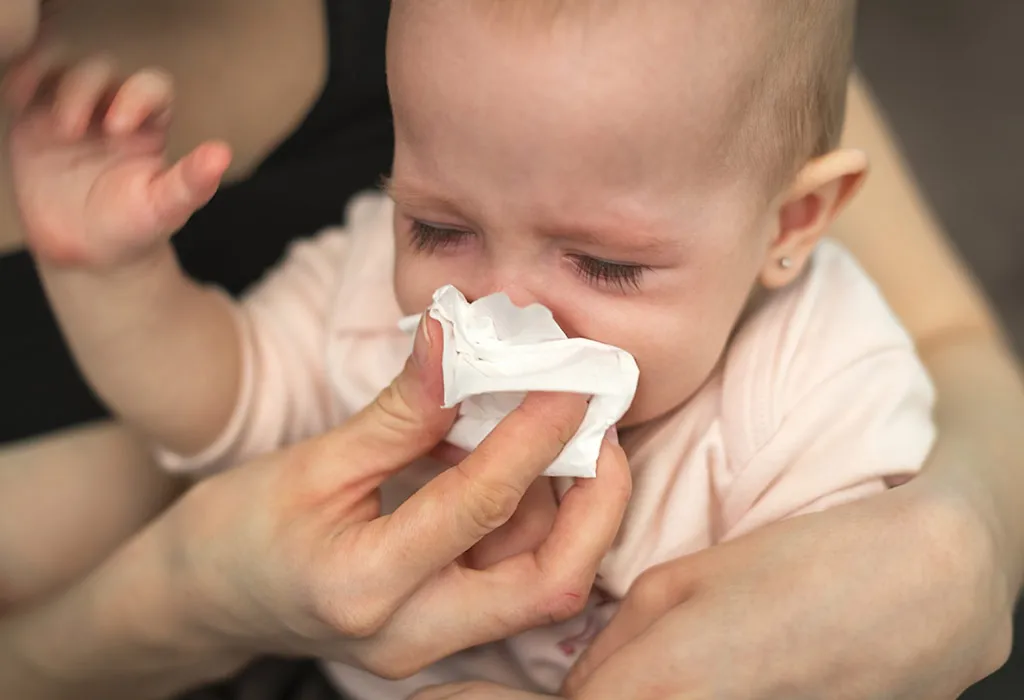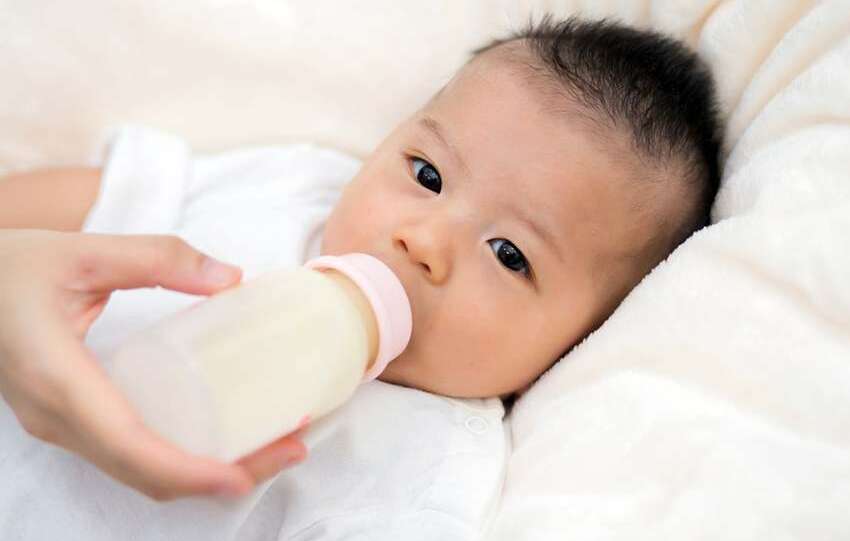Babies are known for spitting up, which is why you may have received a lot of burp cloths at your baby shower. This is a normal reflex called infant reflux, where milk is pushed up from the stomach into the esophagus. Sometimes this reflex can cause the baby to forcefully expel food, which is known as spit-up.
Due to the nose and mouth connection, spit-up may occasionally come out of the nose. It’s important to note that this reflex is not the same as Gastroesophageal Reflux Disease (GERD), a more serious condition requiring medical attention for treatment.
When the milk comes out of a baby’s nose, it’s referred to as nasal regurgitation, and it’s typically caused by an underdeveloped digestive tract, specifically the lower esophageal sphincter.
This valve is responsible for preventing stomach contents from flowing back up the esophagus in all humans. However, in many babies, particularly those born prematurely or as twins, this valve hasn’t fully developed by the time of birth. Once the valve has matured fully, reflux problems should decrease significantly.
Milk coming out of the baby’s nose while breastfeeding

For new mothers, receiving advice on what to do when milk comes out of their baby’s nose while breastfeeding can be invaluable. While breastfeeding can be a wonderful experience, seeing milk coming out of the baby’s nose can be concerning.
Distractions can often be the culprit behind this phenomenon. If the baby is being breastfed in a room with a lot of activity or noise, they may become distracted. Excessive movement and loud voices can cause the baby to lose focus and forget to swallow the milk, leading to choking and milk coming out through the nose.
To prevent this from happening, it’s essential to create a peaceful and quiet environment for breastfeeding. Find a quiet room with minimal distractions to ensure that the baby can concentrate on feeding without getting sidetracked. Additionally, positioning the baby correctly during breastfeeding can also help prevent milk from entering the nose.
Milk coming out of the baby’s nose after feeding.

If you notice milk coming out of your baby’s nose after feeding, it could indicate that they are having difficulty swallowing or that there’s an issue with their nasal passage. One possible cause of this issue is that your baby’s mouth is not properly sealed around the nipple, causing milk to enter their nasal passage.
Additionally, if your baby has a stuffy nose, it can be challenging for them to breathe while feeding, leading to milk coming out of their nose.
In most cases, this is not a severe issue and can be resolved by adjusting the baby’s position during feeding or taking steps to clear their nasal passage.
Milk coming out of the baby’s nose while sleeping.
If milk is coming out of your baby’s nose while they are sleeping, it could be a sign that your baby has a reflux problem. Reflux occurs when the valve at the top of your baby’s stomach is not fully developed, allowing stomach contents to flow back up into the esophagus. This can cause your baby to spit up milk or even vomit, and in some cases, the milk can come out of their nose.
If you suspect your baby has reflux, you should speak with your pediatrician, who can recommend the best treatment for your baby. In the meantime, there are some steps you can take to help reduce the amount of milk that comes up during feedings.
Such as holding your baby upright for at least 30 minutes after feedings and burping them frequently during feedings. Additionally, you may want to consider smaller, more frequent feedings to help prevent your baby from taking in too much milk at once.
Milk coming out of the baby’s nose and mouth

If milk is coming out of your baby’s nose and mouth simultaneously, it could be a sign of a more severe condition, such as aspiration, which occurs when milk or other fluids are inhaled into the lungs. This can be a dangerous situation that can cause a range of symptoms, such as coughing, wheezing, and difficulty breathing.
If you suspect your baby is aspirating milk or other fluids, seeking medical attention is crucial. Your pediatrician can conduct a thorough evaluation and recommend appropriate treatment based on the underlying cause of the aspiration.
In the meantime, there are several steps you can take to help prevent aspiration. These include positioning your baby correctly during feedings, closely monitoring their breathing and feeding behavior, and considering feeding your baby smaller, more frequent meals to help prevent them from taking in too much milk at once. Taking these precautions can help ensure your baby’s safety and well-being while feeding.
Milk coming out of the baby’s nose after breastfeeding
Milk coming out of your baby’s nose after breastfeeding can be a surprising and concerning experience for new parents. While it’s usually not a cause for alarm, it’s essential to pay attention to your baby’s feeding habits and make sure that they are latching on properly.
Experimenting with different breastfeeding positions and seeking guidance from a pediatrician can also help ensure your baby gets the nourishment they need. In rare cases, milk coming out of the nose may indicate an underlying medical condition, so it’s important to monitor your baby closely and seek medical attention if necessary. With proper care and attention, you can help your baby develop healthy feeding habits and continue to grow and thrive.
Is it bad if milk comes out of the baby’s nose?
A small amount of milk coming out of your baby’s nose during or after feeding is generally not a cause for concern and is common in many babies. However, if it happens frequently or if it causes your baby to have difficulty breathing or swallowing.
Milk coming out of your baby’s nose could be a sign of an underlying medical condition, such as a problem with their swallowing ability or nasal congestion. It is important to monitor your baby closely after milk comes out of their nose to ensure that they are breathing properly and that there are no signs of distress.
What to do when milk comes out of baby’s nose
If milk comes out of your baby’s nose during or after feeding, you should gently tilt their head forward to allow the milk to drain out. You may also want to use a bulb syringe to suction out any remaining milk from your baby’s nose.
It is important to monitor your baby closely after milk comes out of their nose to ensure that they are breathing properly and that there are no signs of distress. If your baby seems to be having difficulty breathing or if the problem persists, you should seek medical attention immediately.
To prevent milk from coming out of your baby’s nose in the future, make sure that your baby is properly positioned during feedings and that their mouth is completely sealed around your nipple. You may also want to try feeding your baby smaller, more frequent meals to prevent them from taking in too much milk at once.
If you have any concerns about your baby’s feeding habits or if the problem persists, you should consult with a pediatrician. They can evaluate your baby and provide you with additional guidance on how to ensure that your baby is feeding properly.
Why does milk come out of my baby’s nose
Milk coming out of a baby’s nose can occur for a few reasons.
- First, it may be a result of the baby having difficulty swallowing, particularly if they are a premature baby or if they have a medical condition that affects their swallowing ability.
- Second, it may be due to a problem with the baby’s latch or positioning during feeding. If the baby is not properly latched onto your breast or bottle, milk may leak out of their mouth and into their nose.
- Third, it could be due to an issue with the baby’s nasal passages, such as a stuffy nose or congestion. This can cause milk to get trapped in their nose and come out after feeding.
In most cases, a small amount of milk coming out of a baby’s nose is not a cause for concern and will not harm your baby. However, if you notice that your baby is consistently experiencing this issue or if they seem to be having difficulty breathing or swallowing, you should speak with a pediatrician. They can evaluate your baby and provide and provide you with guidance on how to address the issue.
What to do when milk comes out of baby’s nose and mouth
If milk comes out of your baby’s nose and mouth during or after feeding, tilt their head forward to allow the milk to drain out. To prevent milk from coming out in the future, make sure your baby is properly positioned and try feeding them smaller, more frequent meals. Consult a pediatrician if you have concerns about your baby’s feeding habits.
Why does milk sometimes come out of my baby’s nose
Babies are masters in the art of spitting up milk. Reflux is the term for this frequent occurrence. Sometimes, milk can come out of a baby’s nose.
This is typically accepted as normal and could result from a variety of causes. Let’s examine some of the causes of nasal regurgitation in your newborn in more detail.
Baby ingesting too much air while being breastfed-If your baby has trouble swallowing or has a medical condition that impairs their capacity to swallow, it may occur.
Milk can flow out of a baby’s mouth and into their nose if they don’t latch properly onto the breast or bottle. Your infant will be taking in air when nursing if the latch is improper. Later, the air escapes, carrying the majority of the milk with it.
Additionally, if a baby has congestion in their nasal passages, milk may get caught there before passing out after feeding. A small bit of milk coming out of your baby’s nose is typically nothing to worry about, but if it continues or causes breathing problems, you should consult a pediatrician.





